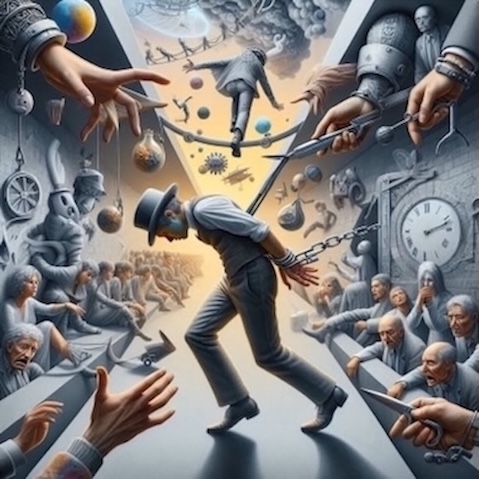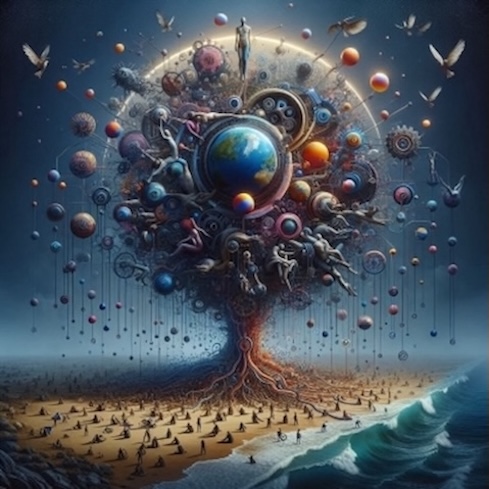How Conventional Narratives Are Always Wrong?
Before getting into "Conventional Narratives Are Always Wrong" to explain how they are all wrong, so you will know what to do and how to change such narratives, we should first know how these established formal narratives have come to exist in our lives and what they do or impact us with.
 Conventional Narratives Are Always Wrong: A surreal visual subverts traditional storytelling norms created within established conventional narratives.
Conventional Narratives Are Always Wrong: A surreal visual subverts traditional storytelling norms created within established conventional narratives.This topic is analysed through in four segments, echoing of which has a page on this website and these analyses are in turn connected with around 15 subjects, which you can read by titles in the following and then explore at the last sections of the Global Dynamics.
These are the intertwined pages including this page:
- Why Expanding Horn Africa to Include Other States and Global Impacts?
- A New Era of Chaos and Distrust is Shaping!
- Pre-Cold War Era of Colonialism & Imperial Rivalries!
- Pre-Cold War American Expansionism!
- The Cold War Era: A Battle of Ideologies and Influence!
- Why Do Nations Fragment When Unity is Their Greatest Strength?
- Eastern Europe Socialist Bloc Fragmentation!
- Sudan and U.S. Policy: A Terrorism Connection? What's The Real Story?
- Eritrea Was Too Late to Independence Due to Colonial Conspiracies!
- Namibian Road to Independence From Liberation to Sovereignty!
- The Post-Cold War Era: A Shifting Global Landscape!
- How Economics, Ideology, and Geopolitics Fragment Nations and Create New Ones?
- New World Order: Stability or Chaos?
- Why Am I Saying A New Era of Disorder and Doubts is Shaping?
- Rewriting History: The Lies We Inherit!
- Illusion of Institutional Narratives!
- Why Prevailing Perspectives Fail Us?
- Conventional Narratives Are Always Wrong!
How Conventional Narratives Have Shaped?
Conventional narratives have played a huge role in shaping societies, beliefs, and even historical perceptions. They help define what people see as "normal" or "truth," often reinforcing prevailing perspectives without deep questioning. Here are a few ways conventional narratives have shaped the world:
1. National Identity and History
Many countries craft conventional narratives about their past to foster national unity. For example, historical events are often presented in a way that glorifies certain leaders or omits uncomfortable truths. The idea that a nation is always morally superior or heroic in conflicts is a narrative that influences citizens' perspectives on patriotism.
2. Economic Systems and Work Culture
The narrative that "hard work guarantees success" has shaped entire economies. While effort is important, this idea often overlooks systemic inequalities and barriers that prevent many from achieving upward mobility. By accepting this narrative without scrutiny, societies sometimes neglect deeper discussions on wealth distribution and economic fairness.
3. Gender Roles and Social Expectations
Traditional gender roles are deeply ingrained in many societies due to long-standing narratives. The idea that men should be providers and women should be caregivers was widely accepted for centuries, shaping family structures, employment opportunities, and even laws. While these narratives are being challenged today, their historical influence is still evident.
4. Scientific and Technological Progress
Conventional narratives have shaped how people view scientific advancement. For example, the idea that "technology always leads to improvement" is widely accepted, despite concerns about ethical issues like privacy, AI biases, and environmental impact. The assumption that all innovation is beneficial can sometimes prevent critical evaluation of its consequences.
5. Social Hierarchies and Power Structures
Many societies historically justified inequality through narratives that framed certain groups as more deserving of privilege. Whether through aristocracy, caste systems, or racial segregation, conventional stories reinforced ideas of superiority and inferiority, making systemic discrimination seem natural or justified.
By shaping public opinion and reinforcing societal norms, conventional narratives often define how people think, act, and structure their world. Breaking these narratives requires critical thinking, questioning dominant assumptions, and exploring alternative perspectives.
National Identity and History: The Power of Conventional Narratives!
National identity is often built on historical narratives that define a country’s past, values, and collective memory. These narratives shape how citizens view their nation, reinforcing unity, pride, and sometimes even exclusionary perspectives. While they can foster a sense of belonging, they can also distort history by emphasizing certain events while ignoring others.
1. The Myth of National Exceptionalism
Many nations promote the idea that they are uniquely great or superior. This narrative often highlights victories, cultural achievements, and resilience while downplaying failures or injustices.
Example: The American Dream
The United States has long upheld the narrative of the American Dream, which suggests that anyone can achieve success through hard work. While this idea fosters optimism, it often ignores systemic inequalities, such as racial discrimination and economic barriers, that make upward mobility difficult for many.
Example: British Imperial Legacy
In the UK, conventional narratives about the British Empire often focus on its contributions to global trade, governance, and infrastructure. However, these stories frequently omit the exploitation, colonization, and resistance movements that shaped the empire’s history.
2. Selective Memory in National History
Countries often emphasize certain historical events while minimizing or omitting others to create a cohesive national identity.
Example: France and the Revolution
France celebrates the French Revolution as a triumph of liberty and democracy. While it was a pivotal moment in history, conventional narratives often overlook the violence, political instability, and suppression of dissent that followed.
Example: Japan’s WWII Narrative
Japan’s official history textbooks tend to focus on the country’s post-war recovery and economic success while downplaying its role in World War II, particularly regarding wartime aggression in Asia. This selective memory influences how younger generations perceive their country’s past.
3. National Identity Through Cultural Symbols
Symbols, traditions, and historical figures play a crucial role in reinforcing national identity.
Example: Germany and Vergangenheitsbewältigung
Germany has actively confronted its past through Vergangenheitsbewältigung (coming to terms with the past), acknowledging the atrocities of World War II. This approach contrasts with other nations that avoid discussing darker aspects of their history.
Example: Russia and Soviet Nostalgia
In Russia, Soviet-era achievements such as space exploration and military strength are often highlighted in national narratives, while the repression and economic struggles of the Soviet period are less emphasized.
Conventional narratives shape national identity by reinforcing collective memory, pride, and unity. However, they can also distort history by selectively presenting events. Understanding these narratives allows societies to critically engage with their past and create a more balanced perspective.
Economic Systems and Work Culture: The Influence of Conventional Narratives!
Economic systems and work culture are deeply influenced by **conventional narratives**—stories that shape how people perceive labor, success, and financial structures. These narratives often reinforce societal expectations, sometimes distorting reality or limiting alternative perspectives.
1. The “Hard Work Equals Success” Narrative
Many societies promote the idea that hard work alone leads to success. While effort is undeniably important, this narrative often overlooks systemic barriers such as economic inequality, access to education, and inherited wealth.
Example: The American Dream
The United States has long upheld the American Dream, which suggests that anyone can achieve prosperity through determination. While this idea fosters motivation, it often ignores structural challenges like wage stagnation, racial disparities, and the rising cost of living.
Example: Japan’s Work Ethic
Japan’s work culture is heavily influenced by the gaman (perseverance) philosophy, which encourages employees to endure long hours and prioritize company loyalty. While this has contributed to economic growth, it has also led to concerns about work-life balance and mental health.
2. The “Free Market Solves Everything” Narrative
Many economic systems emphasize the idea that free markets naturally lead to prosperity. While market-driven economies encourage innovation, this narrative often downplays issues like corporate monopolies, worker exploitation, and environmental consequences. Through the policies of capitalist systems the free market and open market polices, which were implemented parallel to the collapse of the Socialist Bloc have turned upside down with the new economic polices that led to Trade Wars.
Example: Deregulation in the U.S.
The belief that less government intervention leads to economic growth has shaped policies in the U.S., particularly in industries like finance and healthcare. However, deregulation has sometimes led to crises, such as the 2008 financial collapse. Although this term reflects internally, it doesn't reflect on the American international policy.
Example: Privatization in Latin America
Several Latin American countries have embraced privatization under the assumption that private companies are more efficient than government-run services. While this has improved some industries, it has also led to reduced access to essential services for lower-income populations.
3. The “Job Stability Over Innovation” Narrative
In some cultures, job security is prioritized over entrepreneurship or career shifts. While stability provides financial security, this narrative can discourage risk-taking and innovation.
Example: Germany’s Apprenticeship System
Germany’s education system strongly emphasizes apprenticeships, ensuring job stability for young workers. While effective, it sometimes limits career flexibility, making it harder for individuals to switch industries.
Example: Government Jobs in India
In India, government jobs are highly sought after due to their stability and benefits. However, this preference can discourage entrepreneurship, slowing innovation in certain sectors.
Conventional narratives shape how societies view work, success, and economic policies. While these stories provide structure, they can also limit alternative perspectives and reinforce systemic inequalities. Understanding these narratives allows individuals and policymakers to critically assess their impact and explore more balanced approaches.
The "Self-Made Success" Myth: How Conventional Narratives Distort Reality?
The idea of the "self-made individual" is one of the most enduring conventional narratives in modern society. It suggests that anyone, regardless of background, can achieve success through hard work and determination. While this belief fosters motivation, it often distorts reality by ignoring systemic inequalities, discrimination, and the role of inherited wealth in shaping economic outcomes.
1. The Illusion of Equal Opportunity
The self-made success narrative assumes that everyone starts from the same position, but in reality, economic inequality creates vastly different starting points.
Example: Wealth Disparities in the U.S.**
Studies show that individuals born into wealth have significantly higher chances of financial success compared to those from lower-income backgrounds. Access to elite education, professional networks, and financial safety nets give privileged individuals a head start, making the idea of “equal opportunity” misleading.
Example: The Role of Family Wealth
Many billionaires and business leaders benefit from inherited wealth, yet they are often portrayed as self-made. Jeff Bezos, for instance, received a **$250,000 investment from his parents to start Amazon. Similarly, Elon Musk’s family owned an emerald mine in Apartheid South Africa, providing him with financial security that most aspiring entrepreneurs lack.
2. Discrimination and Systemic Barriers
The self-made success myth ignores the discriminatory structures that prevent marginalized groups from achieving the same level of success.
Example: Racial Wealth Gap
In many countries, racial minorities face systemic barriers to wealth accumulation. In the U.S., Black and Hispanic families have significantly lower median wealth compared to white families, largely due to historical discrimination in housing, employment, and education. Despite this, the self-made narrative often dismisses these disparities.
Example: Gender Inequality in Business
Women entrepreneurs frequently face challenges such as limited access to funding, gender biases, and workplace discrimination. Yet, the self-made success myth rarely acknowledges these obstacles, reinforcing the false idea that success is purely a result of personal effort.
3. The Reality of Inherited Wealth
Many of the world’s wealthiest individuals inherit financial advantages that make their success far more attainable than for the average person.
Example: The Forbes Billionaire List
A significant percentage of billionaires come from wealthy families, yet they are often labeled as "self-made". Kylie Jenner, for example, was declared a self-made billionaire, despite coming from one of the richest and most influential families in the U.S..
Example: Tax Loopholes and Wealth Preservation
Wealthy individuals often benefit from tax loopholes and financial strategies that allow them to preserve and grow their wealth while paying minimal taxes. This further widens the gap between the rich and the working class, contradicting the idea that success is purely based on merit.
The self-made success myth distorts prevailing perspectives by ignoring the realities of inequality, discrimination, and inherited wealth. While hard work is important, success is often shaped by structural advantages that conventional narratives fail to acknowledge. Recognizing these factors allows for a more honest discussion about economic mobility and social justice.
Continue to Social Conventional Narratives among the Global Dynamics Sections below.
The Global Dynamics Can Overcome Conventional Narratives & Other World Problems!
You'll be surprise about How The Global Dynamics Can Overcome Conventional Narratives & Other World Problems!
Through decades, I have been working these International Global Dynamics and experimenting them through some projects I achieved, one of them is the project of the Eritrean Martyr's Tree in which I used all of the media, where I worked, motivated all necessary authorities, trade unions and schools through direct contacts and meeting and the people have planted more than 5 millions of martyr's Tree in all of the regions.
While doing that through the shift of global political system in 1989-1990-19i91 specifically I arranged and translated a fundamental law to establish the National Eritrean Environment Organization. The shift of global political system has encouraged me to do these activities to defeat the shift and the changes in the ecosystem, at the same time.
The success of the project is a sign that the Universal Dynamics of mine work. To make them work for you explore these dynamics, Rethink and connect with me and other to build the grassroots for the change.
This world belong to us... its people not to dominant established conventional narratives that have continued to destruct our world for a very long time. Get up. Rise like the Phoenix from your aches.
Conventional Narratives Are Always Wrong: The 3 T's of the Trade Wars that Tremble the World! [The Insight Lens Latest: 2025-04-17] Support me here Incredible videosConventional Narratives Are Always Wrong: Economic Crossfire: Avoid Ripple Effects! [Latest on The Insight Lens: 2025-04-17] Support me here Follow the Insight Lens
Conventional Narratives Are Always Wrong: Trump's Trade War: Economic Shockwaves Across the Globe! [Latest on The Insight Lens: 2025-04-17]
Conventional Narratives Are Always Wrong: Trade Wars: US vs China Showdown! [Latest on The Insight Lens: 2025-04-16]
Conventional Narratives Are Always Wrong: Trade Wars: Global Economy's Rollercoaster Ride! [Latest on The Insight Lens: 2025-04-17]
Conventional Narratives Are Always Wrong: Bee Crisis: Government Cuts Sting Hard! [Latest on The Insight Lens: 2025-04-17]
Conventional Narratives Are Always Wrong: Trade Wars Aftermath: Global Economies on the Edge! [Latest on The Insight Lens: 2025-04-17]
Conventional Narratives Are Always Wrong: Trade Wars Fallout: Global Economic Battles! [Latest on The Insight Lens: 2025-04-18]
Conventional Narratives Are Always Wrong: The World is Heating Amid Trade Wars – A Crisis Ignored! [Latest on The Insight Lens: 2025-04-24]
Conventional Narratives Are Always Wrong: Biovians Speak: Trade Wars & Climate Crisis Through Nature’s Voice [The Insight Lens: 2025-04-24]
Conventional Narratives Are Always Wrong: Exploring the Unknown: Life, Environment & Cybersecurity! [Latest on The Insight Lens: May 06, 2025]
Conventional Narratives Are Always Wrong: Space Exploration vs. Earth's Survival: The Real Dilemma! [Latest on The Insight Lens: Tuesday, May 06, 2025]
Conventional Narratives Are Always Wrong: Space Exploration: A Double-Edged Sword? [Latest on The Insight Lens: Wednesday, May 07, 2025]
Conventional Narratives Are Always Wrong: Space Wars: The Next Frontier! [Latest on The Insight Lens: Thursday, May 08, 2025]
Conventional Narratives Are Always Wrong: Are We Repeating Colonial Mistakes in Space? [Latest on The Insight Lens: Thursday, May 08, 2025]
Conventional Narratives Are Always Wrong: From Colonial Empires to Space Frontiers: Lessons Unlearned [Latest on The Insight Lens: May 9, 2025]
Conventional Narratives Are Always Wrong: The Hidden Dangers of Space Exploration: Are We Going Too Far? [Latest on The Insight Lens: May 10, 2025]
What Do You Think of "Conventional Narratives Are Always Wrong"?
Conventional Narratives Are Always Wrong... They serve established dominant narratives that serve ruing elites of governments, but not you... not the people of the world. This is a free option platform that refuses to be subjected to silly compliance without even having a word to say about them. compliance are made to silence you.
Share your option and stand up.
Have A Great Story About This Topic?
Do you have a great story about this? Share it!
Did you get any of my books from Apple Books?
Click here to tell me & get some free books. Fill the form.
رواية "الموتُ شرقاً" تكشف لك سرّ الموت الشرقي التراجيدي المستمر للإنسان
احصل علي الرواية الآن واكتشف إنهيار القواسم المشتركة، واستلهم إبداعا يشبه الأسطورة في النص الروائي
"Follow", "like", "tweet", or "pin" the pictures to express your love! Thanks
TweetHorn Africa's Political Tragedy
Love in the Internet Time on Apple Books
Rising of the Phoenix Poetry on Apple Books
Free Poetry Picture Book
Free poetry picture book on Apple Books. You can use the images on public places for your customers to enjoy, while taking coffee.
The French & Spanish Versions
You can work the French versions and the Spanish versions of the two books above with me on, one on one bases. Contact Us.
HOAs Political Poetry Imaged
I'll be thankful, if you get one of my books.
My Books!
Publish Your BookLet's be the publishers of your book. Use the form at Contact Us.
































































































